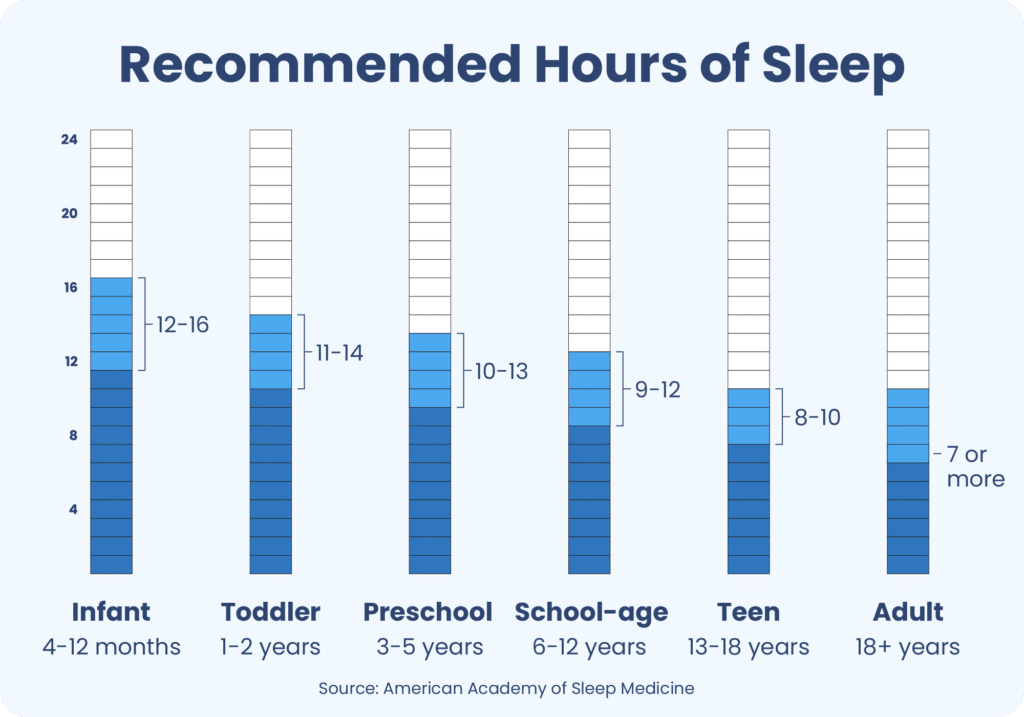Sleep is one of life’s non-negotiables, yet so many of us struggle to get enough of it. Between work, social life, and maybe even doom-scrolling at night (no judgment!), proper sleep often takes a back seat. But here’s the thing: sleep is essential for your health and happiness.
From memory improvement to emotional well-being, sleep is your body’s time to recharge, repair, and grow. In this guide, we’ll break down how much sleep you actually need, why quality matters, and what happens when you skimp on this vital activity.
Why Sleep Is So Important

You already know sleep is important, but did you know it affects nearly every part of your body? Here’s what happens while you snooze:
- Brain Boost: During REM sleep, your brain processes information and improves long-term memory.
- Body Repair: Deep sleep is when your body heals tissues, builds muscle, and strengthens your immune system.
- Mood and Energy: Sleep helps regulate stress hormones and keeps your emotions in check.
- Metabolism: Proper rest supports a healthy weight and reduces cravings.
Sleep isn’t just about avoiding yawns at your desk. It’s the foundation for better health and well-being.
How Much Sleep Do You Need by Age?

The amount of sleep you need changes as you grow. Below are the National Sleep Foundation’s recommendations:
| Age Group | Recommended Sleep |
|---|---|
| Infants (4–12 months) | 12–16 hours (including naps) |
| Toddlers (1–2 years) | 11–14 hours (including naps) |
| Preschoolers (3–5 years) | 10–13 hours (including naps) |
| School-age kids (6–12 years) | 9–12 hours |
| Teens (13–18 years) | 8–10 hours |
| Adults (18–64 years) | 7–9 hours |
| Older adults (65+) | 7–8 hours |
Why Sleep Needs Decrease with Age
As we age, our sleep patterns naturally change. Older adults tend to sleep more lightly and wake up more frequently during the night. However, their overall sleep needs don’t drastically decrease—they just might find it harder to get uninterrupted rest.
The Importance of Sleep Quality
It’s not just about how many hours you log; it’s about how good those hours are. Sleep quality includes factors like:
- Continuity: Are you sleeping straight through, or waking up multiple times?
- Depth: Are you spending enough time in deep sleep (the most restorative phase)?
- Refreshment: Do you wake up feeling energized and ready to tackle your day?
If you’re tossing and turning, even eight hours in bed might leave you feeling exhausted.
What Impacts Sleep Quality?
- Disruptions: Noisy environments, uncomfortable mattresses, or frequent bathroom trips.
- Lifestyle Habits: Caffeine, alcohol, or late-night screen time can all mess with your sleep cycles.
- Stress: Racing thoughts can keep you awake or interrupt deep sleep.
Risks of Sleep Deprivation
Missing out on sleep can do more than make you cranky, it can seriously affect your health. Here are some risks associated with sleep deprivation:
Short-Term Effects
- Poor focus and memory.
- Reduced emotional resilience.
- Increased risk of accidents or injuries.
Long-Term Risks
- Heart Health: Chronic sleep deprivation is linked to high blood pressure and heart disease.
- Metabolism Issues: Increases the risk of type 2 diabetes and obesity.
- Weakened Immunity: Your body struggles to fight off illnesses.
- Mental Health: Lack of sleep can contribute to anxiety and depression.
Simple Ways to Get Better Sleep
If you’re struggling to get enough sleep, don’t worry small changes can make a big difference.
1. Stick to a Sleep Schedule
- Go to bed and wake up at the same time every day, even on weekends.
- This helps regulate your internal clock.
2. Create a Relaxing Bedtime Routine
- Dim the lights and avoid screens an hour before bed.
- Try calming activities like reading, meditating, or taking a warm bath.
3. Optimize Your Bedroom
- Temperature: Keep your room cool (around 65°F).
- Lighting: Use blackout curtains or an eye mask to block out light.
- Noise: Use earplugs or a white noise machine.
4. Limit Caffeine and Alcohol
- Avoid caffeine after 2 p.m.
- Skip that nightcap alcohol can disrupt REM sleep.
5. Exercise Regularly
- Even 20 minutes of physical activity a day can improve sleep quality.
- Just don’t work out too close to bedtime.
6. Watch Your Diet
- Eat dinner at least two hours before bed.
- Avoid heavy, spicy, or sugary foods late at night.
FAQs About Sleep Needs
Q1: Can I “catch up” on sleep over the weekend?
Not really. Sleeping in on weekends might make you feel better temporarily, but it won’t erase the effects of chronic sleep deprivation. Stick to a consistent schedule instead.
Q2: Why do older adults wake up so often at night?
Aging affects sleep patterns, making sleep lighter and more fragmented. Hormonal changes and health conditions can also contribute.
Q3: Is it normal to wake up during the night?
Yes, brief awakenings are natural. However, if you’re waking up frequently and struggling to fall back asleep, it might be a sign of poor sleep quality.
Q4: How much deep sleep do I need?
Deep sleep should make up about 20–25% of your total sleep. For a typical 8-hour night, that’s about 1.5–2 hours.
Q5: What if I still feel tired after 7–9 hours of sleep?
You might not be getting enough restorative sleep. Look into factors like sleep apnea, stress, or your bedroom environment. A sleep study could help uncover the issue.
Final Thoughts
Sleep is one of the best gifts you can give yourself. Whether you’re a new parent running on fumes or a teen trying to balance school and social life, getting the right amount of high-quality sleep is key.
Start by setting a consistent sleep schedule and making small changes to your nightly routine. And remember, if you’re still struggling, don’t hesitate to talk to a doctor a good night’s sleep is too important to leave up to chance.
References
- National Sleep Foundation. (2023). Sleep Duration Recommendations by Age. Retrieved from https://www.sleepfoundation.org
- Centers for Disease Control and Prevention (CDC). (2023). How Sleep Impacts Overall Health. Retrieved from https://www.cdc.gov
- Harvard Health Publishing. (2023). The Importance of Sleep Quality. Retrieved from https://www.health.harvard.edu
- Grandner, M. (2024). Sleep Loss and Its Effects on Metabolism and Cardiovascular Health. Sleep Research Insights.
- American Academy of Sleep Medicine. (2023). Improving Sleep Hygiene for Better Rest. Retrieved from https://www.aasm.org


